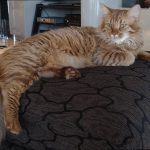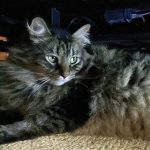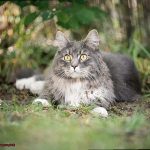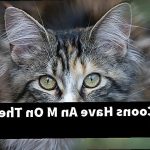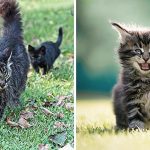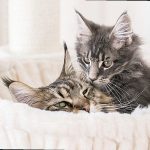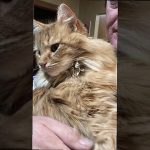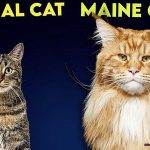Are you considering a Maine Coon as your new furry family member? Or maybe you’ve already welcomed one home and noticed their insatiable hunger. With their friendly demeanor and impressive size, it’s no surprise that Maine Coons have become a popular breed. But, let’s get to the heart of the matter – do Maine Coons really have big appetites?
In short, yes. These majestic felines are notorious for their love of food and aren’t afraid to vocalize when they’re hungry. As a result of their large build, Maine Coons require plenty of energy to maintain their health and playful personalities. So, it’s only natural that they have an equally big appetite.
In this blog post, we’ll explore the reasons behind Maine Coons’ hearty appetites. Not only will you discover just how much they adore eating, but we’ll also dive into creating a well-balanced diet for your furry friend. We’ll even cover common feeding mistakes to avoid and ways to prevent obesity – a condition that can lead to health problems in these gentle giants.
Whether you’re already smitten with Maine Coons or just curious about their eating habits, keep reading to learn more about these adorable felines’ big appetites.
What is a Maine Coon?
Originating in the United States, Maine Coons are a stunning breed of domestic cat that have become a popular pet choice for many people around the world. These cats are known for their large size, distinctive appearance, and friendly personality. In this blog post, we’ll explore what makes Maine Coons so special and why they are often referred to as the “gentle giants” of the cat world.
Physical Appearance
Maine Coons are the largest domestic cat breed, with males weighing up to 18 pounds and females ranging from 8-12 pounds. Their long fur comes in various colors and patterns, and they have tufted ears and bushy tails that add to their unique look. One of the most intriguing physical features of Maine Coons is their paws, which have an extra toe that resembles a thumb. This gives them a distinctive look and makes them stand out from other breeds.
Personality
Maine Coons are intelligent and adaptable cats that make great companions for families and individuals alike. They are famously known for their friendly and sociable nature, earning them the nickname “gentle giants.” Despite their large size, Maine Coons are gentle and affectionate cats that get along well with other pets and children. They also have excellent hunting skills due to their natural instinct to catch mice and other rodents.
Appetite
Many people wonder if Maine Coons have a big appetite due to their size. While they do have a healthy appetite, they are not necessarily prone to overeating or obesity. In fact, Maine Coons tend to have a slower metabolism, which means they may require fewer calories than other cats of similar size. However, it’s important to monitor their food intake and ensure they are getting the appropriate amount of nutrients for their individual needs.
Love for Water
One unique thing about Maine Coons is their love for water. They are fascinated by running water, and many of these cats enjoy drinking from faucets or playing in water bowls. This can lead to increased hydration, which can also contribute to a healthy appetite.
Physical Characteristics of the Maine Coon
The Maine Coon, a breed of feline royalty, is a sight to behold. As an expert in this field, I can attest to their impressive physical characteristics that make them stand out from the rest.
First and foremost, the Maine Coon is one of the largest domesticated cat breeds. With a muscular and sturdy build, they command attention at first glance. However, their size is not an indication of their personality as these gentle giants are known for their friendly and affectionate nature.
Their long shaggy fur is another defining characteristic. Available in a wide range of colors and patterns, each Maine Coon is truly unique. And let’s not forget about those tufted ears that give them an adorable look.
But what sets these cats apart from the rest is their appetite. They have a hearty appetite due to their size and their origins as working cats on farms and ships. Hunting their own prey was necessary for survival which may have led to their love for food.

However, it is important for owners to keep a close watch on their cat’s diet. Obesity can lead to various health problems like diabetes and joint issues. A balanced diet with appropriate portion sizes and regular exercise will keep your Maine Coon healthy and happy.
Do Maine Coons Have Big Appetites?
Maine Coons are renowned for their impressive size and muscular build. They are natural hunters and were originally bred to work on farms and ships, which required them to be physically fit and energetic. This active lifestyle burns more calories than sedentary cats, resulting in a higher metabolism and a larger appetite.
Coupled with their active lifestyle is their love of food. Maine Coons are not picky eaters and will devour anything you put in front of them. However, this can lead to overeating and obesity if their food intake is not monitored closely. Therefore, it’s vital to provide them with a balanced diet that meets their nutritional needs without overfeeding them.
It’s essential to note that not all Maine Coons have big appetites, and some individuals may have a smaller appetite or be more particular about their food choices. Nonetheless, as a breed, they tend to have larger appetites than other cats due to their natural tendencies and love for food. Therefore, it’s crucial to monitor their food intake and provide them with regular exercise and playtime to maintain a healthy weight.
Factors That Can Affect a Maine Coon’s Appetite
Maine Coons are an impressive breed with a hearty appetite, but there are several factors that may affect their eating habits. As a Maine Coon expert, I’m here to share some insights into the factors that can impact your feline friend’s appetite.
Age is an important factor that can impact a Maine Coon’s appetite. Kittens require more frequent feeding because of their higher energy requirements, while older Maine Coons may have a decreased appetite due to age-related health issues.
Another significant factor that affects a Maine Coon’s appetite is their activity level. If your cat is more active and burns more calories, they will likely need more food to compensate for the energy loss. Conversely, if your cat is less active, they may not require as much food.
The type and quality of food you feed your Maine Coon can also affect their appetite. Dry kibble tends to be less appealing to cats than wet food, and some cats may need a mix of both to maintain a healthy weight. High-quality cat food with real meat as the first ingredient will generally be more satisfying and nutrient-rich than lower quality alternatives.
Stress and anxiety can also significantly impact a Maine Coon’s appetite. Cats are sensitive creatures that can become stressed for various reasons, including changes in their environment or routine, which can cause them to lose their appetite or overeat as a coping mechanism.
Lastly, underlying health issues can significantly impact a Maine Coon’s appetite. If your cat suddenly loses interest in food or begins overeating, it is crucial to consult with your veterinarian to rule out any underlying medical conditions.
The Role of Hydration in a Maine Coon’s Appetite
Yes, that’s right. Maine Coons are prone to dehydration, which can lead to a decreased appetite and other health issues. So, let’s explore the fascinating topic of “The Role of Hydration in a Maine Coon’s Appetite.”
To ensure that your Maine Coon is well hydrated at all times, there are several steps you can take. Firstly, providing fresh, clean water is a must. You can use a water fountain or multiple water bowls throughout your home to encourage your cat to drink more water. This way, water is always available and fresh. Additionally, feeding your Maine Coon wet food is an excellent way to increase their water intake since it has a higher moisture content than dry food.
But it’s not just about providing enough water; monitoring your cat’s water intake is just as important. If you notice that your Maine Coon isn’t drinking as much water as usual or isn’t eating as much as they typically do, it could be a sign of dehydration or other health issues. In such cases, contacting your veterinarian is essential.
Now, let’s dive deeper into why hydration is so crucial for your Maine Coon’s appetite and overall health. Dehydration can lead to numerous health issues such as urinary tract infections, kidney stones, and even organ failure. These conditions can significantly affect your cat’s appetite and overall well-being.
So, to keep your Maine Coon healthy and happy, make sure they are getting enough water. You can also add hydration-boosting treats like ice cubes or wet food to their diet. To summarize, here are some key takeaways:
- Fresh, clean water should always be available.
- Wet food has a higher moisture content than dry food.
- Monitor your cat’s water intake and contact your veterinarian if there are any changes in their behavior or appetite.
- Dehydration can lead to several health issues, affecting your cat’s appetite and overall well-being.
Proper Nutrition for a Healthy Appetite in Maine Coons
While Maine Coons are known for their big appetites, it’s essential to provide them with a balanced and nutritious diet to keep them healthy.
One of the most important aspects of proper nutrition for Maine Coons is high-quality protein sources. Chicken, turkey, and fish are excellent sources of protein that provide the necessary amino acids for maintaining healthy muscle mass. It’s essential to avoid fillers such as corn or wheat gluten, which can lead to weight gain and digestive issues.
In addition to protein, vitamins and minerals are also vital for maintaining a healthy appetite in Maine Coons. These nutrients are necessary for maintaining healthy bones, skin, and hair. However, it’s crucial to avoid foods that are high in magnesium and phosphorus as Maine Coons have a tendency to develop urinary tract problems.
Monitoring food intake is critical for preventing obesity in Maine Coons. Overfeeding can lead to serious health consequences such as diabetes and heart disease. A good rule of thumb is to feed your cat twice a day with each meal consisting of about a quarter cup of dry food.
Finally, providing fresh water at all times is essential for maintaining a healthy appetite in Maine Coons. Dehydration can cause a decrease in appetite and lead to health issues such as urinary tract infections and kidney stones. Consider investing in a water fountain for your cat as many cats prefer running water over still water.
Signs of Unhealthy Eating Habits in Maine Coons
One significant aspect of their well-being is their eating habits. Although Maine Coons are known for having big appetites, excessive eating can lead to unhealthy habits that can cause long-term health problems. As an expert on this breed, I have identified several signs that pet owners should look out for to ensure their cat’s diet is healthy.
Firstly, weight gain is a common sign of unhealthy eating habits in Maine Coons. These cats require a sufficient amount of food to maintain their health, but overeating and insufficient exercise could lead to obesity. Obesity can trigger diabetes, joint pain, heart disease and other health issues in your feline friend.
Another common sign of an unhealthy diet is food aggression. Maine Coons may become aggressive or possessive around food if they’re not getting enough to eat or if their diet is lacking essential nutrients. Food aggression may lead to conflicts with other pets or even with humans; it’s important to address this problem as soon as possible.
Gastrointestinal issues are also indicators of unhealthy eating habits in Maine Coons. Overeating or consuming certain types of food could lead to digestive problems such as vomiting, diarrhea, or constipation. These issues could be signs of more serious health problems and should be addressed by a veterinarian.
Lastly, any changes in behavior surrounding mealtimes could indicate an underlying health issue or dental problem. If your Maine Coon suddenly loses interest in food or becomes excessively picky about what they eat, it could be a sign that they’re experiencing discomfort while eating.
Tips for Ensuring Healthy Eating Habits in Your Maine Coon
Maine Coons are known for their big appetites and love for food, but it’s important to ensure that they maintain healthy eating habits to avoid health issues. Here are five tips for ensuring your Maine Coon has a healthy diet:
Establish a Feeding Schedule
Establishing a feeding schedule can help prevent overeating and obesity. Feed your cat at the same time every day and stick to a set amount of food. This will also help regulate their digestive system.
Choose High-Quality Cat Food
Look for high-quality cat food that is appropriate for your Maine Coon’s age, size, and health needs. Make sure the cat food contains real meat as the first ingredient and avoid foods with fillers or artificial ingredients.
Monitor Your Cat’s Weight
Monitor your cat’s weight regularly to ensure they maintain a healthy weight. Adjust their food intake accordingly if you notice any changes in their weight. If your Maine Coon is gaining weight, reduce their food intake slightly, and if they are losing weight or appear hungry, increase their food intake.
Provide Fresh Water
Keep fresh water available for your Maine Coon at all times. Some cats prefer running water, so consider investing in a cat fountain. The water bowl should be cleaned regularly to prevent bacterial growth.
Avoid Human Food
Avoid giving your Maine Coon table scraps or human food as this can lead to unhealthy eating habits and digestive issues. Stick to high-quality cat food and occasional treats in moderation.
Conclusion
In conclusion, Maine Coons are a breed of feline royalty that have taken the pet world by storm. With their large size, friendly personalities, and insatiable hunger, these majestic cats have captured the hearts of cat lovers everywhere.
While it’s true that Maine Coons have big appetites, it’s important to remember that proper nutrition is key to their health and well-being. Age, activity level, and food quality all play a role in how much your Maine Coon will eat.
To avoid overfeeding and prevent obesity or other health issues, it’s essential to monitor your cat’s food intake. Providing fresh water at all times is also crucial for maintaining healthy eating habits in Maine Coons.
If you notice any signs of unhealthy eating habits in your furry friend such as weight gain, food aggression or gastrointestinal issues it may be time to adjust their diet or feeding schedule. Regular monitoring of your cat’s weight is also important to ensure they stay healthy.
By establishing a feeding schedule with high-quality cat food and avoiding giving them human food you can help maintain healthy eating habits in your beloved Maine Coon.
